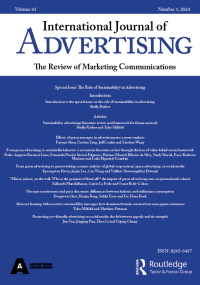Who will buy the idea of non-fungible token (NFT) marketing? Understanding consumers’ psychological tendencies and value perceptions of branded NFTs
IF 5.9
3区 管理学
Q1 BUSINESS
引用次数: 0
Abstract
AbstractInnovative companies are experimenting with branded NFTs as part of their marketing strategies to engage consumers who are seeking exclusive content. Young consumers tend to be early adopters of blockchain technologies and are seeking branded NFTs for their own purposes. Using a U.S. sample of Gen-Z and Millennials (n = 1,053), we examined the values (i.e. informative, entertainment, unique, expressive values) consumers are seeking in the acquisition and display of branded NFTs and explored how their tendencies toward status consumption, perceived financial constraint, and dispositional innovativeness influenced their willingness to engage in brand WOM. The analyses confirmed the proposed model and revealed that value perceptions (unique, entertainment, and expressive values) helped elicit an individual’s sense of status consumption and dispositional innovativeness. This relationship resulted in positive brand WOM. For the financially constrained, the unique value offered by NFTs was important for positive WOM to manifest. This research helps both marketers and policymakers better understand consumers’ psychological responses to branded NFTs.Keywords: Non-fungible token marketingstatus consumptiondispositional innovativenessfinancial constraintsvalue perceptionbrand WOM Disclosure statementNo potential conflict of interest was reported by the author(s).Data availability statementDue to the ethical nature of the research, supporting data is not available.Additional informationFundingThis work was supported by the Southern Methodist University under the Meadows Faculty Development Grant.Notes on contributorsQuan XieQuan Xie (Ph.D., Ohio University) is an Assistant Professor of Advertising at the Temerlin Advertising Institute in Southern Methodist University. Her research focuses on the advertising effects in the interrelated contexts of digital technologies and culture. From this perspective, she investigates the mechanisms through which advertising affects information processing, consumer behavior, and brand building at the intersection of digital media and culture. Her research topics focus on content marketing, digital advertising, and social media advertising. Her research has been published in the Journal of Advertising, Journal of Business Research, International Journal of Advertising, Journal of Interactive Advertising, Journal of Product & Brand Management, and Journal of Research in Interactive Marketing, among others.Sidharth MuralidharanSidharth Muralidharan (Ph.D., The University of Southern Mississippi) is an Associate Professor and Director of Graduate Studies at the Temerlin Advertising Institute in Southern Methodist University. He formerly worked as a junior account executive for Zehnder Communications, New Orleans. His primary research interests lie in pro-social marketing, specifically, advertising’s impact on mitigating social and environmental issues in India and abroad, while secondary research interests include social media and online advertising. His work has been published in the Journal of Advertising, Journal of Advertising Research, International Journal of Advertising, International Journal of Consumer Studies, and Cyberpsychology, Behavior, and Social Networking, among others.Steven M. EdwardsSteven M. Edwards (Ph.D., UT Austin) is a recognized scholar on persuasive communication in new media environments and teaches classes on analytics, social media marketing, consumer engagement, and brand loyalty using gamification. His research explores feelings of intrusiveness and reactions of consumers to 3D interactive experiences online. His research has appeared in numerous journals and books. He is past editor of the Journal of Interactive Advertising, Vice-President of the American Academy of Advertising, and serves on the Editorial Review Boards of the premier journals in the field. Other research explores product placements, motivations for using the Internet, and the impact of negative information on the effectiveness of celebrity endorsers.谁会购买不可替代代币(NFT)营销的想法?了解消费者对品牌nft的心理倾向和价值认知
【摘要】创新公司正在尝试将品牌nft作为其营销策略的一部分,以吸引那些寻求独家内容的消费者。年轻消费者往往是区块链技术的早期采用者,他们正在为自己的目的寻求品牌nft。我们以美国z世代和千禧一代为样本(n = 1053),考察了消费者在购买和展示品牌nft时所追求的价值(即信息、娱乐、独特、表达价值),并探讨了他们的地位消费倾向、感知到的财务约束和性格创新如何影响他们参与品牌口碑传播的意愿。分析证实了所提出的模型,并揭示了价值观念(独特的、娱乐的和表达的价值观)有助于引发个人的地位、消费和性格创新意识。这种关系产生了积极的品牌口碑。对于财政拮据的国家来说,nft提供的独特价值对于积极的口碑表现是很重要的。这项研究有助于营销人员和政策制定者更好地了解消费者对品牌nft的心理反应。关键词:不可替代代币营销现状消费配置创新财务约束价值感知品牌口碑披露声明作者未报告潜在的利益冲突。数据可用性声明由于研究的伦理性质,无法获得支持数据。本研究得到了南卫理公会大学梅多斯学院发展基金的支持。谢泉(俄亥俄大学博士),南卫理公会大学特默林广告学院广告学助理教授。她的研究主要集中在数字技术和文化相互关联的背景下的广告效应。从这个角度来看,她研究了广告在数字媒体和文化的交叉点上影响信息处理、消费者行为和品牌建设的机制。她的研究课题主要集中在内容营销、数字广告和社交媒体广告。她的研究成果发表在《广告杂志》、《商业研究杂志》、《国际广告杂志》、《互动广告杂志》、《产品与品牌管理杂志》和《互动营销研究杂志》等杂志上。Sidharth Muralidharan(博士,南密西西比大学)是南卫理公会大学Temerlin广告学院的副教授和研究生研究主任。他曾在新奥尔良的先达通信公司(Zehnder Communications)担任初级客户主管。他的主要研究兴趣是亲社会营销,特别是广告对缓解印度和国外社会和环境问题的影响,而次要研究兴趣包括社交媒体和在线广告。他的作品发表在《广告杂志》、《广告研究杂志》、《国际广告杂志》、《国际消费者研究杂志》、《网络心理学、行为和社交网络》等杂志上。Steven M. Edwards(德克萨斯大学奥斯汀分校博士)是新媒体环境中说服性沟通的公认学者,教授分析学、社交媒体营销、消费者参与和使用游戏化的品牌忠诚度课程。他的研究探讨了消费者对在线3D互动体验的侵入感和反应。他的研究发表在许多期刊和书籍上。他是互动广告杂志的前任编辑,美国广告学会副主席,并在该领域的主要期刊的编辑审查委员会任职。其他研究则探讨了产品植入、使用互联网的动机,以及负面信息对名人代言效果的影响。
本文章由计算机程序翻译,如有差异,请以英文原文为准。
求助全文
约1分钟内获得全文
求助全文

 求助内容:
求助内容: 应助结果提醒方式:
应助结果提醒方式:


